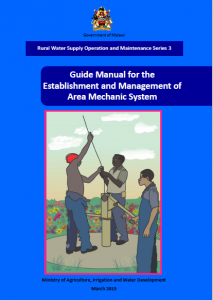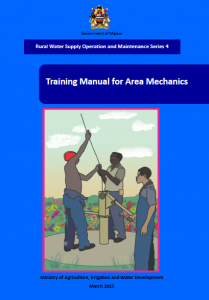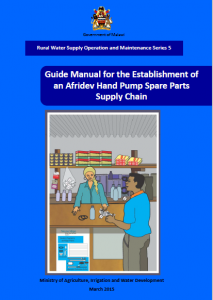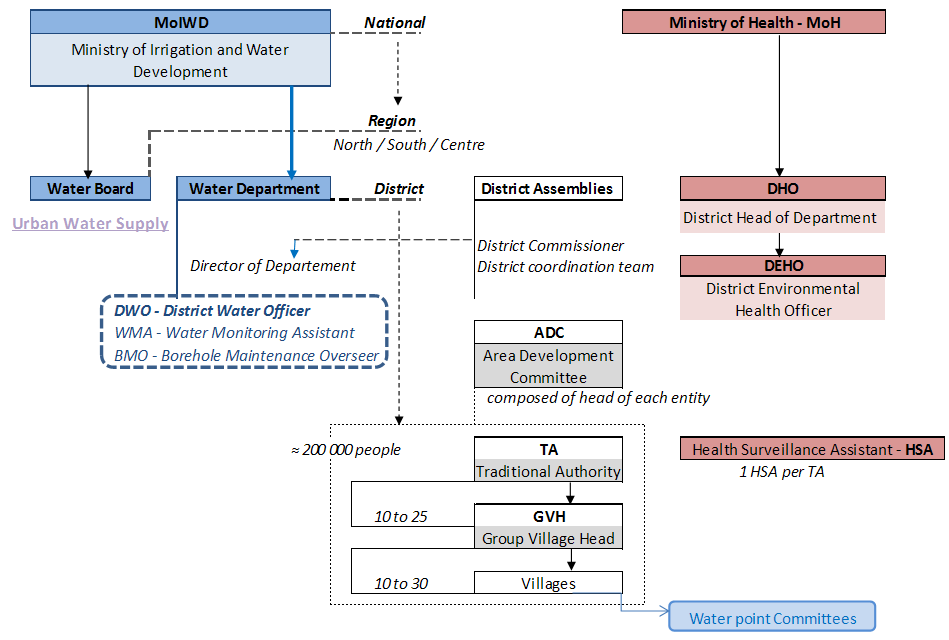
Local government structure
1 District Councils
The Council is supposed to be headed by the Chairperson selected from amongst its 10 councilors each representing a ward in the district. The District Commissioner is the head of Council Secretariat, which is composed of Professional Heads of Government Sectors in the district.
The council must have the following service committees: Finance Committee; Development Committee; Education Committee; Works Committee, Appointment and Disciplinary Committee Health and Environment Committee which is the custodian committee on water and sanitation issues. It may establish other committees when need arises.
2 District Executive Committee – DEC
This is a technical body that provides advice to the Council and its service committees. It is composed of all Heads of Departments and NGO/Development partners in the district. The District Executive has a membership of 50, chaired by the District Commissioner while the Director of Planning and Development is its secretary. The DEC has a subcommittee of District Coordinating Team (DCT) on water, sanitation and hygiene. Membership of the committee consists of both the sector heads and non-state actors involved in water, sanitation and hygiene. The committee is chaired by the Director of Planning and Development with secretariat for sanitation in Health Sector. The main role of the DCT is coordination of water, sanitation and hygiene activities in the district.
3 Area Development Committees – ADCs
The Area Development Committee (ADC) is a representative body of all Village Development Committees under a Traditional Authority. Its membership could range from 25 to 60 under the patronage of the Chief. It mobilizes community resources and implements development interventions within it’s the area.
Membership includes Group Village Headpersons, Representative of Women Groups, and representative of Youth Groups, the District Councilors of the area, and Business and Religious Leaders. The district follows a decentralized approach in implementing all projects in the district, water and sanitation inclusive. It is the role of the ADC to prioritize the demand driven WASH projects from all village development committee’s in a traditional authority.
The ADC also assists in the identification an overall project that cuts across the ADC i.e. piped water systems and mobilization of resources during the course of implementation of a project.
4 Area Executive Committees – AECs
An Area Executive Committee is composed of Extension workers of Government and Non-Governmental Organizations (NGOs) operating in the Traditional Area. At the area level Government extension workers in the WASH sector are the Health surveillance assistance and water monitoring assistant. This committee is the technical arm at the area level responsible for advising the ADCs on all aspects of development.
5 Village Development Committees – VDCs
This is a representative body from a group of villages responsible for identifying needs and facilitating planning and development in local communities. It is at this level that the communities raise their needs and demand projects like boreholes or taps. The VDC is chaired by an elected chair which the group village head is patron. Members of the VDC include members of the following committees and groups:
- Water Point Committee
- Project Implementation Committee
- Village Health Committee
- School Management Committee
- Functional Literacy Committee
- Women &Youth Groups
- Village Natural Resources Management Committee
- Water point committees






